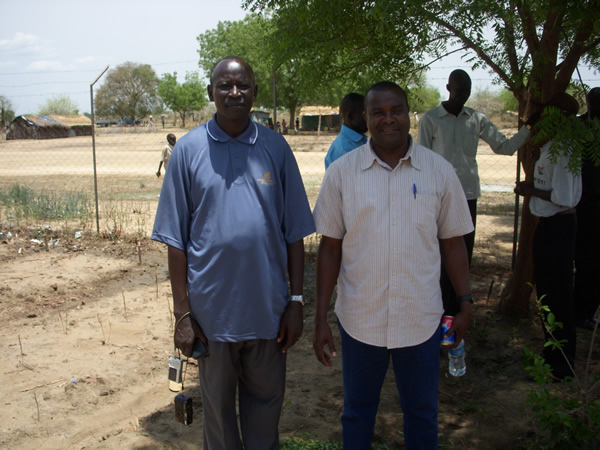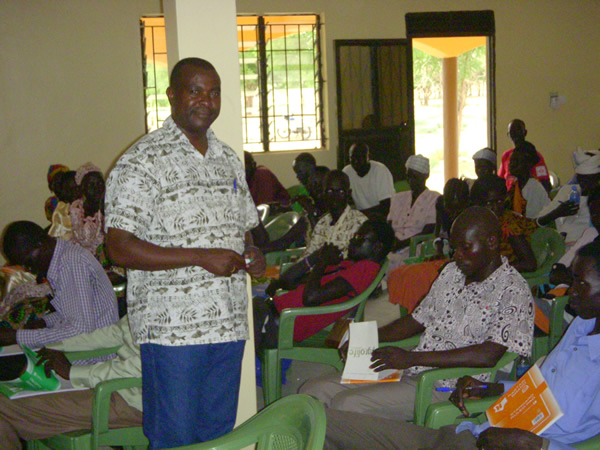East Africa Report
Photo: Rev. Dr. Stephen Mathiang (left) with Samuel at the Mission Gardens for Christ. South Sudan The initial stop in his trip was in the newly independent state of South Sudan, where he observed and assisted Samuel Nderitu of G-BIACK, Kenya, in the final series of in-country training for smallholder farmers in the State of Jonglei. The trainings, funded by USAID, took place at the Mission Gardens for Christ near Bor, the capital of Jonglei. This is a region marred by ethnic clashes over basic resources of land, food, and water during the past few years. The Jonglei Peace Conference, signed in May 2012, has been trying to improve the situation in the area. Jonglei State forms the bulk of the eastern part of South Sudan, with a semi-arid to arid climate. The Borlaug Institute, which administers the project, chose Mission Gardens for its suitability as both a training center and a site for a GROW BIOINTENSIVE demonstration garden. Mission Gardens, located about five miles outside of Bor, is run by Rev. Dr. Stephen Mathiang, who has dedicated his life to helping the people of South Sudan. Participants for the two-day training were brought in from surrounding areas and included men and women representing different tribal groups: the Dinka, the Murle and the Nuer peoples. This diversity of trainees required Samuel's instruction to be translated into Dinka, Nuer and Arabic, meaning a slower way of training, but with more people reached.
Photo: Samuel instructing participants at the two-day training. Day two of the training found some of the participants actively volunteering information they had learned on the first day. Peter Aguto Kucha from G-BIACK, who was assisting with the training, led the hands-on demonstration work. Two beds were laid out and quickly double-dug by the group, using a jembe (a medium-handled hoe with a blade angled back towards the handle, which is used all over East Africa and in some other African countries). While the beds were being dug, Samuel and Jake met with Mayen Ngor Atem, the Minister of Agriculture of Jonglei State. Following lunch at the UN Food Program compound, the group returned to Mission Gardens to go over composting and plant spacing in the afternoon. The day was completed with a review of the training material, the giving of certificates, and songs sung by the women. The group was an enthusiastic one, and Jake is optimistic that the group's follow-up data will demonstrate improved food security, nutrition and income. Kenya The second segment of Jake's trip to East Africa took him to the GROW BIOINTENSIVE Agricultural Centre (G-BIACK) in Thika, Kenya, approximately 40 km northeast of Nairobi. Samuel and Peris Nderitu have spent the last four years developing this site into a demonstration garden and training facility. Jake's goals were to assist in the development of a Strategic Planning Document, to assess future infrastructure and personnel needs, and to visit those farms in the area that are working to implement the GROW BIOINTENSIVE method. Newly arrived, Jake toured the site, met the staff and was impressed by the number of plantings and projects under way, including the 40-bed unit, water-logged that day due to heavy rains in the region. In addition to training thousands of small-scale farmers at their center, Samuel and Peris have established a community library and seed bank and are developing plans to expand. Jake was escorted to outlying farms by Mary Wangui, who interned at Circle of the Sun with Dan and Margo Royer-Miller in the summer of 2011. Mary is a community resource person for G-BIACK and provides training and support in the field for those farmers who have trained at G-BIACK. The group visited three farms to the north and east of Thika, luckily on a day when the rains stopped. (Although Thika is situated at the edge of a lush, green region to the north and west, it is considered semi-arid, and lack of water is often a problem.) The first farm visited was one that produces eggplant, kale, maize, coffee, avocados and mangos and also maintains a few animals. The farmer and his family have recently converted to organic production, including coffee. Previously they had experienced declining yields in the coffee, as they were gathering the leaves and debris under the bushes and burning them. As they shifted to making their own compost and leaving the decomposing leaf litter in place, they have seen improved health in the coffee bushes and larger yields, as well as a higher price for organic. According to Jake, the price the farmer receives is still low, and he thinks there could be an opportunity for organic fair trade, although this might require the formation of a farmers' marketing cooperative in order to obtain more leverage with coffee buyers. The second farmers visited were Douglas Kimani, his wife Sofia Wanja and their six children, who live on approximately a half acre of land about a mile off the paved road. Following their training at G-BIACK, Douglas and Sofia set up a Biointensive garden where they grow food crops such as bananas, maize, sorghum, and beans. They also started a tree nursery with different agro-forestry tree species. In order to supplement the family's diet and income, the couple bought 3 female goats for the purpose of milk production and the sale of young kids. According to a recent report from Samuel, the family is now eating a complete diet and earning an average of 15,000 Kenyan shillings (just under $200) per month from the sale of vegetables, tree seedlings, dairy goats and milk. Prior to their work with G-BIACK, they were making only $25 per month working as casual laborers on neighboring farms. They are very pleased with their production and increase in income and are thinking about making a few small loans to neighbors, as they are part of a community lending circle.
Photo: Mary, Sofia, Jake, Douglas and Peris at Kimani Farm. Following the tour of farms, Samuel, Peris and Jake spent time discussing the Strategic Plan.Working together, they developed a budget that would include funds for facilities designed to house farmers and students on site, enhancing G-BIACK's training capacity. Other needs critical to the expansion of programs at the Center include a well and a transport vehicle. Both Samuel and Peris are eager to support other groups and discussed the possibility of expanding to Nyeri, an hour and a half north of Thika, where a school has offered an acre and a half to establish a GB demonstration garden. According to Jake, the Strategic Planning Document is an important tool, both for G-BIACK and for EA as fiscal sponsor, to establish goals and the budget to help bring the goals to fruition. For a country that experiences drought and food insecurity, high rates of HIV/AIDS and the ill effects of conventional agricultural practices, this training center provides a vision of a more secure and productive future. (Editor's note: The account of Jake's visit to Rwanda will appear in the next (Winter 2014) Newsletter.)
top | Newsletter Home | Article Index | Archive
|




